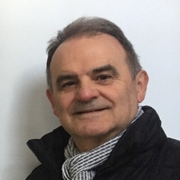
Murray’s heart event inspired exhibition
A heart event that sparked artistic expression
Murray Cheney's 2023 heart event was not a stopping point but rather an artistic springboard.
In June 2024, he held an exhibition featuring 22 paintings that chronicled his journey through illness and recovery. Despite the success of the exhibition, Murray still ranks waking up after heart surgery as his "most satisfying achievement."

That was one KPI to cherish and celebrate. The medical fraternity has given me a wondrous gift – the gift of a prolonged and enriched life.
Murray Chenery
Heart surgery survivor
Recognising support during recovery
He also expressed deep gratitude for his “wonderful partner,” emphasising her unwavering support throughout this challenging period in his life. "Thank you for holding my hand. To those people who supported me, I deeply and sincerely thank each one of them.”
Early warning signs: listening to his body
Like many heart patients, the lead-up to Murray’s diagnosis was uneventful. Fortunately, he didn’t ignore the early warning signs. While walking with his partner in early 2023, the then-65-year-old struggled to keep pace and experienced a burning sensation in his chest.
“I thought it might have been indigestion from the sourdough I had for breakfast before we left,” he recalled. His partner, Lyn, a healthcare worker, advised him to consult his GP. Concerned, the doctor scheduled Murray for a stress test.
Tests, surgeries and post-surgery complication
“I failed that miserably. Once the incline went up, I was puffing and had to stop,” he explained. The test results were "abnormal." Following this, an ECG, ultrasound, and angiogram revealed that Murray's left anterior descending artery (LAD), the largest coronary artery extending from the base of the heart to the apex, had significant blockages. One of its branches was 80% blocked, and due to the distance between the clots, stents were not an option.
Murray was scheduled for a double bypass, during which veins were harvested from his legs to bypass the blocked sections of his coronary artery. However, a week after the operation, he was diagnosed with deep vein thrombosis (DVT), a condition where a blood clot forms in a deep vein. In Murray's case, three clots were discovered. He suspects it stemmed from spending too much time sitting inactive as a passenger on long-haul flights.
“I had a DVT before, which led to a pulmonary embolism,” he shared. A pulmonary embolism is a blockage in the pulmonary arteries, usually occurring when a blood clot from a deep vein in the leg dislodges and travels to the lungs.
Turning recovery into art
Despite these challenges, Murray's recovery has been good, something he attributes to his surgeon and the nursing staff. However, he notes that the mental and emotional journey has been particularly difficult and is something people are often unprepared for. Fortunately, he has used his art to contextualise and express his experience.
The exhibition following his heart event included written observations of his feelings at different stages. For instance, the first piece in the exhibition was titled "The Unassuming Discomfort," which is abstract and reflects the subtle signs of trouble that began with that walk when he first felt pain in his chest.
Meanwhile, the final piece, number 22, was called "Magical Sunshine," which embodies positive emotions of delight, gratitude, and appreciation. This work, measuring 2.7m x 1.8m, was auctioned, with all proceeds from its sale ($3,000) donated to the Barwon Health Foundation in recognition of the wonderful work done by its staff.
“My visual journey explored extraordinary, vivid feelings and emotions, helping to explain what I experienced leading up to heart surgery, during the surgical process, and beyond,” he noted. “If this work helps just one other person successfully navigate heart surgery, then it’s been worthwhile.”
Advocating for better heart health care
In November 2024, Murray was invited to the 'Patient and Parliamentary Summit 2024' in Canberra, where he advocated for “increased input into our health system.” Through his art and storytelling, he hopes to paint a brighter future for all people recovering from heart disease.
You might also be interested...

What is angina?
Experiencing chest pain? Learn about angina, its causes, symptoms, and treatments to manage chest pain and protect your heart with expert advice.

Seven surprising symptoms of heart disease
You’re probably familiar with some of the more ‘classic’ symptoms of heart disease. Chest pain (angina) which might feel like an uncomfortable pressure or heaviness. Palpitations or sensation of a racing heart. Feeling short of breath or having difficulty breathing.

Heart bypass surgery
Coronary bypass surgery is a common procedure that can dramatically improve the health of your heart.